Filter by
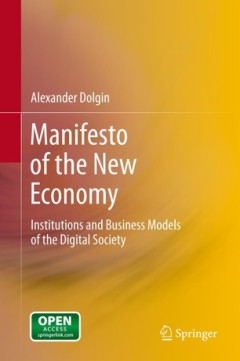
Manifesto of the new economy : institutions and business models of the digita…
The book describes the main directions for the development of the digital society. The author angles its book to those who are interested to know what would replace search engines, and how social networks would evolve; what profit can be made of different forms of informational collaboration (crowdsourcing, collaborative filtering). And, the main thing, how it will influence the structure of th…
- Edition
- -
- ISBN/ISSN
- 9783642212772
- Collation
- vi, 145p. : ill.
- Series Title
- -
- Call Number
- 330 DOL m
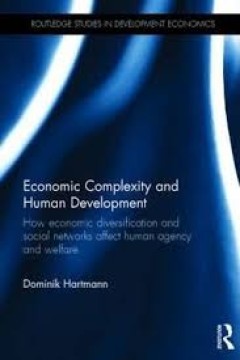
Economic complexity and human development: how economic diversification and s…
This book combines the human development approach and innovation economics in order to explore the effects that structural economic change has on human development. The author discusses how innovation, social networks, economic dynamics and human development are interlinked, and provides several practical examples of social and micro-entrepreneurship in contexts as diverse as Peruvian rural vil…
- Edition
- -
- ISBN/ISSN
- 9780415858915
- Collation
- xxiv, 218 pages : illustrations ; 24 cm
- Series Title
- -
- Call Number
- 306.3 HAR e
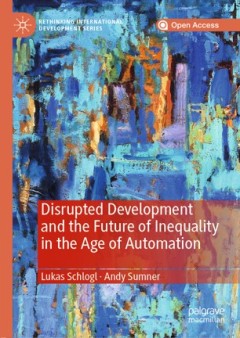
Disrupted development and the future of inequality in the age of automation
This open access book examines the future of inequality, work and wages in the age of automation with a focus on developing countries. The authors argue that the rise of a global ‘robot reserve army’ has profound effects on labor markets and economic development, but, rather than causing mass unemployment, new technologies are more likely to lead to stagnant wages and premature deindustrial…
- Edition
- -
- ISBN/ISSN
- 9783030301316
- Collation
- xiii, 102p. : ill.
- Series Title
- -
- Call Number
- 338.9 SCH d
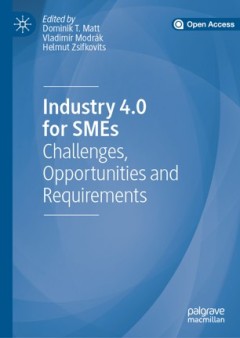
Industry 4.0 for SMEs : challenges, opportunities and requirements
This open access book explores the concept of Industry 4.0, which presents a considerable challenge for the production and service sectors. While digitization initiatives are usually integrated into the central corporate strategy of larger companies, smaller firms often have problems putting Industry 4.0 paradigms into practice. Small and medium-sized enterprises (SMEs) possess neither the huma…
- Edition
- -
- ISBN/ISSN
- 9783030254254
- Collation
- xxxv, 412p. : ill.
- Series Title
- -
- Call Number
- 338.04 IND i
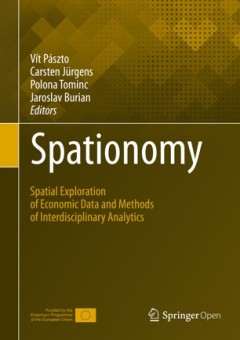
Spationomy : spatial exploration of economic data and methods of interdiscipl…
This open access book is based on "Spationomy – Spatial Exploration of Economic Data", an interdisciplinary and international project in the frame of ERASMUS+ funded by the European Union. The project aims to exchange interdisciplinary knowledge in the fields of economics and geomatics. For the newly introduced courses, interdisciplinary learning materials have been developed by a team of…
- Edition
- -
- ISBN/ISSN
- 9783030266264
- Collation
- viii, 325p. : ill.
- Series Title
- -
- Call Number
- 330.9 SPA s
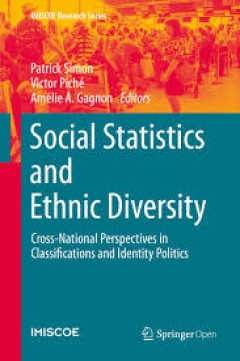
Social statistics and nthnic diversity: cross-national perspectives in classi…
This open access book examines the question of collecting and disseminating data on ethnicity and race in order to describe characteristics of ethnic and racial groups, identify factors of social and economic integration and implement policies to redress discrimination. It offers a global perspective on the issue by looking at race and ethnicity in a wide variety of historical, country-specific…
- Edition
- -
- ISBN/ISSN
- 9783319200958
- Collation
- 2015
- Series Title
- -
- Call Number
- 304.60727 SIM s

Framing in sustainability science : theoretical and practical approaches
This open access book offers both conceptual and empirical descriptions of how to “frame” sustainability challenges. It defines “framing” in the context of sustainability science as the process of identifying subjects, setting boundaries, and defining problems. The chapters are grouped into two sections: a conceptual section and a case section. The conceptual section introduces readers …
- Edition
- -
- ISBN/ISSN
- 9789811390616
- Collation
- viii, 196p. : ill.
- Series Title
- -
- Call Number
- 338.927 FRA f
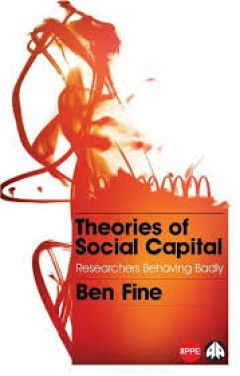
Theories of social capital
Tracing the evolution of social capital since his highly acclaimed contribution of 2001 (Social Capital Versus Social Theory), Ben Fine consolidates his position as the world's leading critic of the concept. Fine forcibly demonstrates how social capital has expanded across the social sciences only by degrading the different disciplines and topics that it touches: a McDonaldisation of social the…
- Edition
- -
- ISBN/ISSN
- 9781849644426
- Collation
- -
- Series Title
- -
- Call Number
- 302 FIN t

Culture & money in the nineteenth century: abstracting economics
Since the 1980s, scholars have made the case for examining 19th-century culture, particularly literary output, through the lens of economics. Bivona and Tromp have collected contributions that push New Economic Criticism in new directions.Spanning the Americas, India, England, and Scotland, this volume adopts a global view of the cultural effects of economics and exchange. Contributors use the …
- Edition
- -
- ISBN/ISSN
- 9780821421963
- Collation
- viii, 230 pages ; 24 cm.
- Series Title
- Series in Victorian studies
- Call Number
- 306.009034 BIV c
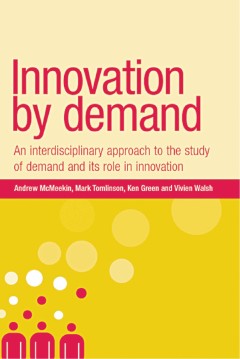
Innovation by demand : an interdisciplinary approach to the study of demand a…
The structure and regulation of consumption and demand has recently become of great interest to sociologists and economists alike, and at the same time there is growing interest in trying to understand the patterns and drivers of technological innovation. This book brings together a range of sociologists and economists to study the role of demand and consumption in the innovative process. The b…
- Edition
- -
- ISBN/ISSN
- 9780719062674
- Collation
- viii. 214p. : ill
- Series Title
- -
- Call Number
- 338.064 INN i
 Computer Science, Information & General Works
Computer Science, Information & General Works  Philosophy & Psychology
Philosophy & Psychology  Religion
Religion  Social Sciences
Social Sciences  Language
Language  Pure Science
Pure Science  Applied Sciences
Applied Sciences  Art & Recreation
Art & Recreation  Literature
Literature  History & Geography
History & Geography